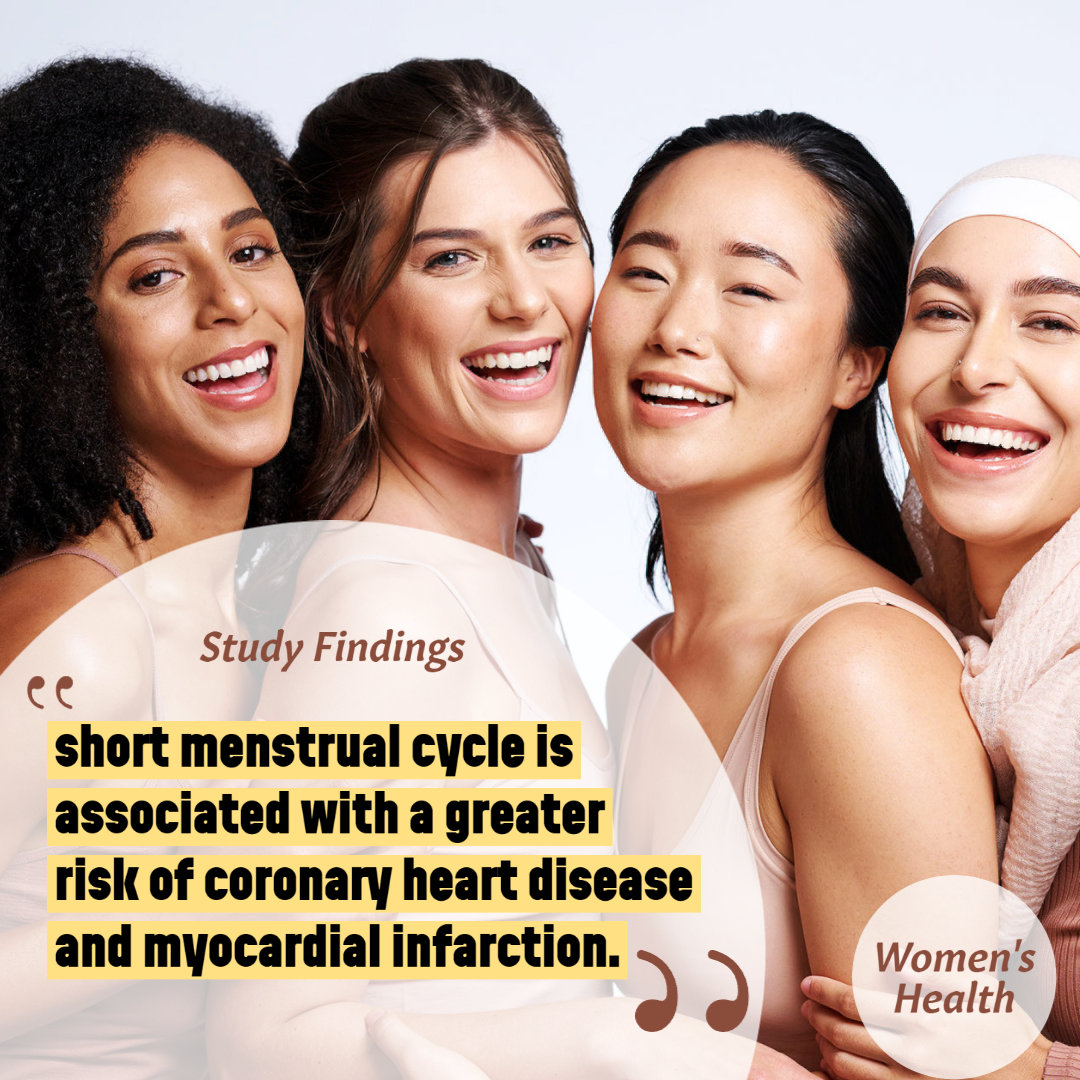Women’s Health
The big picture: Dr. Adriana Davis says: “Women’s health is more than just menstrual health!”
In the news: New research is showing that the length of a woman’s menstrual cycle could tell us something about her heart’s health. Essentially, the research indicates that women with menstrual cycles shorter than 22 days or longer than 34 days may be at a higher risk of developing cardiovascular events in their lifetime.
Key Findings
The research showed 2 important results:
- “Short menstrual cycle length was associated with a greater risk of CHD and myocardial infarction.” Essentially, they’re saying heart attacks.
- “…(L)ong menstrual cycle length was associated with increased risks of atrial fibrillation but not myocardial infarction, heart failure, and stroke.”
These risks were observed even after controlling for numerous factors including age, ethnicity, BMI, and more.
The researchers noted:
- “Short or long menstrual cycle length was associated with a 19% higher risk of heart disease among those women compared to women with menstrual cycle length between 22 to 34 days.”
- “Irregular menstrual cycle length was associated with a 40% higher risk of atrial fibrillation.” (Press Release)
Next steps: Have a conversation with your health care provider and figure out why you’re experiencing menstrual cycles that are shorter or longer than normal.
PCOS, thyroid disorders, obesity, and stress are some of the more common reasons why women experience irregular menstrual cycles.
The good news here: Once these issues are identified and treated, most women’s menstrual cycles can return back to normal.
The American College of Obstetricians and Gynecologists has a great resource on how to treat and manage heavy and abnormal periods. (Visit Resource Here)
- Did you know that 10.0% of you in New London County are in fair to poor health?
This impacts your heart health in Norwich.
The study suggests that menstrual cycle length can be an indicator of cardiovascular events.

The Health Standard Newswire
Doctor’s Expert Insights about Women’s Health and Menstrual Health
Know this: “This study is very important. It shows the importance of seeing women’s health in a whole-body holistic manner. I inform my patients that menstrual cycle irregularities should not be ignored. If you’re experiencing menstrual cycle irregularities as outlined in the study, one key step is to consult with a healthcare provider. Your doctor can help identify any potential underlying health conditions, including cardiovascular risks. Also, maintaining a healthy lifestyle, regular physical activity, stress management, and adequate sleep are important for better health outcomes. Most importantly, these steps also help with reducing your risk of heart disease.” Dr. Puja Uppal, Family Medicine.
Talk to your doctor about your menstrual health.

The Health Standard Newswire
Living in Norwich, the following heart health facts impact your well-being directly!
Did you know there were 6731.0 deaths from heart disease in Connecticut in 2021? This number reflects men and women.
31.3% of you living in New London County are obese.
15.5% of you are smoking.
34.4% of you are sleeping less than 7 hours per night.
All of these variables impact your heart health!
Women’s Health is Important.
The Health Standard Newswire
What they’re saying:
“The results of this large prospective study indicate that women with irregular menstrual cycles were significantly associated with increased risks of CVD. Furthermore, long or short menstrual cycle length was associated with increased risks of CVD and atrial fibrillation but not myocardial infarction, heart failure, and stroke. Short menstrual cycle length was significantly associated with higher risks of CHD and myocardial infarction. These findings point out that women with menstrual cycle dysfunction might have adverse health consequences, and highlight the importance of monitoring menstrual cycle characteristics throughout women’s reproductive life in the prevention of CVD and atrial fibrillation among women.” (Study Source)
“In addition, we found that the relationships between menstrual cycle characteristic and CVD events were modified by smoking status. Likewise, the associations of short menstrual cycle length with incident CVD were significantly stronger among women with baseline HDL‐C <1.3 mmol/L. Therefore, monitoring of menstrual cycle characteristics among those individuals may be particularly noteworthy.” (Ibid)
Sources:
The Journal of the American Heart Association published the findings: Associations of Menstrual Cycle Regularity and Length With Cardiovascular Diseases: A Prospective Study From UK Biobank (Read it Here)
Heart Disease Facts and Stats for Norwich: (CDC)
- Over 60 million women (44%) in the United States are living with some form of heart disease.
- More than 56 million women in the United States (44.3%) have high blood pressure (defined as 130/80 mm Hg or higher) or are taking blood pressure medicine.
The Health Standard Newswire








/cloudfront-us-east-2.images.arcpublishing.com/reuters/P3P4AP7SRNJDZHWZ6GGBJEABEY.jpg)





